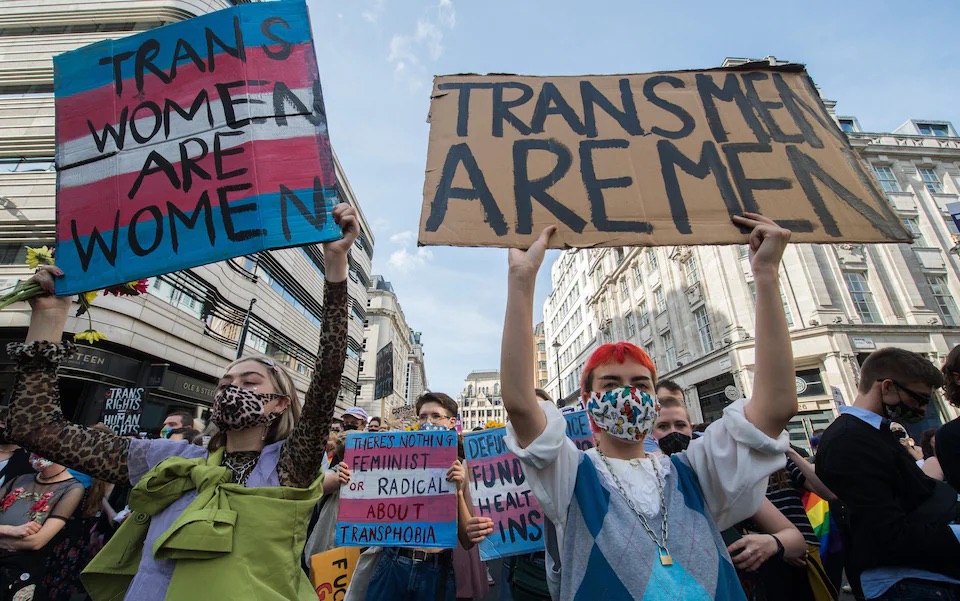Jan Bergstra & Laurens Buijs
Amsterdam Gender Theory Research Team
It is difficult to move in the gender debate without coming into contact with what we refer to as the self-claimed rights of the frontline trans activist.
We use the term frontline transactivism because we would like to retain the term transactivism for people who reasonably advocate for gender diversity. In this sense, we see ourselves without hesitation as transactivists. FGT includes an attempt to provide the phenomenon of gender transition with a long-term sustainable basis.
This is far from obvious, in large parts of the world, in the Roman Catholic Church, the Russian Orthodox Church, among many Evangelical Christians and in part of the Islamic world, as well as in part of the feminist movement, there is no support for gender transition. We are opposed to these movements and forces in terms of transactivism. In doing so, it is then important to know the arguments used and, if possible, to refute them. The frontline transactivist finds such a task nonsensical and unnecessary.
Now the (self-claimed) rights of the frontline transactivist (say P):
- The right to impeach. When another, say, A, on gender theory makes a statement that P does not like, then P may call this A transphobic, antitrans, socially backward.
- The right to name-calling. P as above may seek name calling in addition to accusation, for example by reporting that A violates transgender rights, pursues the disadvantage of transgender erpsons, creates a socially unsafe situation, etc.
- The right to personal destruction. In addition to name calling, P grants himself and fellow frontline trans activists the right to seek the destruction of A, such as through loss of employment, position, visibility or access to the media.
- The right to academic illiteracy. P grants himself the right to consider it completely unnecessary to know or read scientific literature on gender theory. What P does not find attractive does not exist: “cancellation everywhere” is the primary weapon in the debate.
- The right to blind spots. P exempts himself from any self-reflection: the finger is always pointed at the other’s (alleged) extremism, and the question of how that behavior can be a reaction to (possibly) his own extremism is not raised.
Read more about the problems with transactivism:
Transactivism preaches inclusion to mask a systematic practice of exclusion
The frontline trans activist is finding a lot of support in the media these days. Thus, The Correspondent is a useful platform for frontline transactivism.
We mention here the recent contribution of Valentine de Hingh: a tirade against J.K. Rowling, a tirade against the pope who is said to lead the oldest homophobic institution in the world (prove it, homophobia predates the beginning of our era). Of course, the NSC has to take the brunt of it. Omtzicht sits there with “cronies” in the room, and they are conducting populist right-wing politics on the backs of transgender persons.
Valentijn de Hingh’s style of thinking is difficult to follow. Rosanne Hertzberger (NSC) is allegedly calling for a Dutch version of the Cass report (see AGTRT-BF78, AGTRT-BF66 and AGTRT-BF72). This, according to De Hingh, would involve the well known factual record (indeed well known since Cass), and therefore (if we understand De Hingh correctly) is an attempt at delay already characteristic of NSC. NSC doubts culpably when it asks for research, it’s never right either.
De Hingh’s explanation of why NSC does not support the new transgender law is clear: populist use of aversion to transgender persons. What an incredible nonsense that is, even a solid transactivist can find that that bill was not good because it simply leaves too much room for self-identification, a concept that has come under fire with good arguments even in respectable academic circles (see AGTRT-BF76).
Conducting public debate in the Netherlands is not so easy when the media are primarily open to texts such as De Hingh’s. We see in De Hingh no trace of self-reflection: the finger is only pointed at the other camp. Not for a moment is the question asked as to where all the opposition to gender transition we are currently seeing (whether justified or not, and whether it is expressed extremist or not) actually comes from.
Not a word does De Hingh mention the complications in transgender health care that we have been hearing about for years (see AGTRT-BF66). Complications that are fueled by a one-sided debate about gender transition, and the stigma that threatens to incur anyone who expresses the slightest criticism, or even dares to ask a question.
How is it that The Correspondent sees it as a manifestation of quality journalism to post such a one-sided story just now, just after publication of pediatrician Hilary Cass’ report on problems in British care provision for transgender youth (see AGTRT-BF78)?
It is no wonder that J.K. Rowling resists the long string of accusations and attempted name-calling in her direction. We certainly do not agree with Rowling in every respect, but for someone of Rowling’s stature to oppose the right to personhood claimed by frontline trans activists in her direction is quite understandable (see AGTRT-BF60).
Anyone who sees the ease with which De Hingh can write in mockingly condescending terms about anything and anyone who has a different opinion can see how absolutely necessary it is (explicitly for the debate in the Netherlands as well) for someone with the visibility and economic power and independence of J.K. Rowling to systematically and permanently stand up for freedom of expression in the area of gender (see AGTRT-BF16).
However difficult it appears to be to understand that from the miraculously arrogant management of this gem of Amsterdam’s canal belt: Valentijn de Hingh’s writing style in De Correspondent is simply an example of undesirable behavior!
